'Tantamount to economic suicide'published at 15:12 BST 21 May 2015
 Image source, Getty Images
Image source, Getty ImagesThe former leader of the Scottish Conservative leader says fiscal autonomy without fiscal balancing would be "tantamount to economic suicide".
9.30am: Standards, Procedures and Public Appointments Committee
11.40am: General questions
12pm: First minister's questions
Next: Scottish Fire Sprinkler Coordination Group debate
2.30pm: An interim report on the Smith Commission and the UK government's proposals debate
Ailsa Brown and Craig Hutchison
 Image source, Getty Images
Image source, Getty ImagesThe former leader of the Scottish Conservative leader says fiscal autonomy without fiscal balancing would be "tantamount to economic suicide".
Conservative MSP Annabel Goldie says it is important to build consensus rather than political divisiveness.
Ms Goldie says it is important for us in the Scottish and UK parliament to provide constructive commentary on this process.
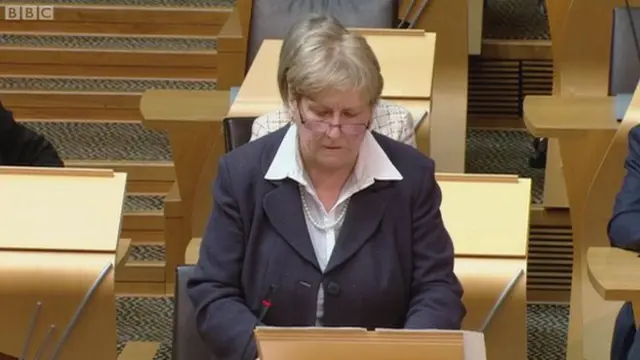
Conservative MSP Annabel Goldie
She says we must ensure the Smith Agreement is effectively brought forward bringing both the spirit and letter.
Ms Baillie says we must bed down the powers that we have and prepare for the powers that are coming.
The Labour MSP says she wants to see power further devolved to communities saying the SNP have been one of the most centralising governments
Ms Baillie says with new financial responsibility comes more robust and independent financial scrutiny,
The Labour MSP says that the most disappointing draft clauses related to welfare, saying it illustrates the behind the scenes efforts of the DWP to thwart the Smith Agreement.
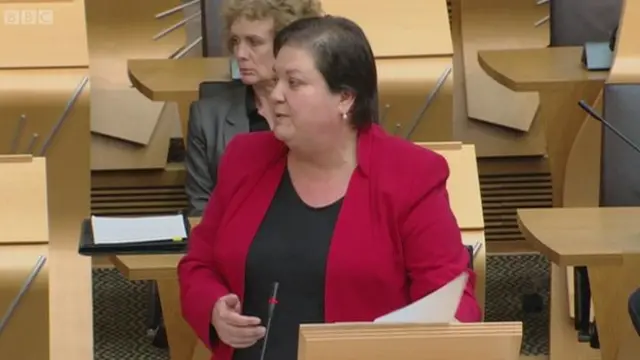
Labour MSP Jackie Baillie
"That is simply not good enough." She says.
Labour MSP Jackie Baillie says everyone wants to see that the letter and spirit of the Smith Agreement is fully translated into a legislative package which will be contained in the first Queen's speech of the new parliament.
The deputy prime minister concludes saying the priority is that the Scotland Bill reflects in full the contents of the Smith Commission.
Mr Swinney says the prime minister met with the first minister on Friday and the discussions were helpful.
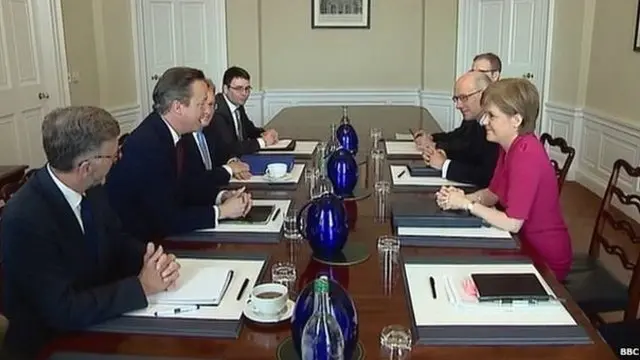
The meeting is being held at the first minister's official residence at Bute House in Edinburgh
David Cameron said he would "look at" any proposals for further powers for Scotland but wants to get the Smith Commission plans implemented first.
The prime minister was speaking after meeting Scotland's First Minister Nicola Sturgeon in Edinburgh.
Mr Cameron said he made a "commitment" to include a devolution bill in the Queen's Speech later this month.
Ms Sturgeon argued the Smith Commission proposals were "a good starting point" but did not go far enough.
The prime minister has pledged to include a bill on devolution in this month's Queen's Speech which would be based on the cross-party Smith Commission agreement.
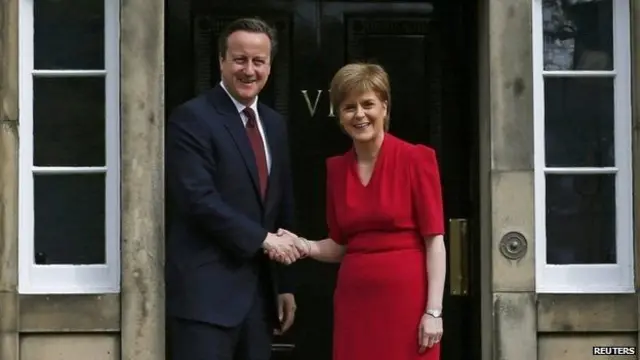
Mr Swinney says a successful negotiation of the fiscal framework is one of his highest priorities in the months ahead.
The deputy first minister says the Scottish government has made proposals to the UK government for improvements to the draft clauses.
Mr Swinney says the committee found the drafting of the clause were overly restrictive over the transfer of welfare powers to Scotland.
He raises the issue of the the veto clause in relation to Universal Credit, saying the Scottish government has made representations to the UK government on the issue.
The deputy first minister says the result of the independence referendum was clear and decisive, which is why the Scottish government played a full part in the Smith Commission.
Mr Swinney says the publication of the UK government's command paper in January did not deliver Smith in full.
The Scottish government has been working with the UK government to improve the clauses to address the issues and deficiencies.
Mr Swinney says the all party parliamentary committee found that the draft clauses that were published by the UK government do not meet the "spirit or substance" of the Smith Commission.
Deputy First Minister John Swinney praises the committee's report saying it is important that the MSPs gave unanimous backing to it.
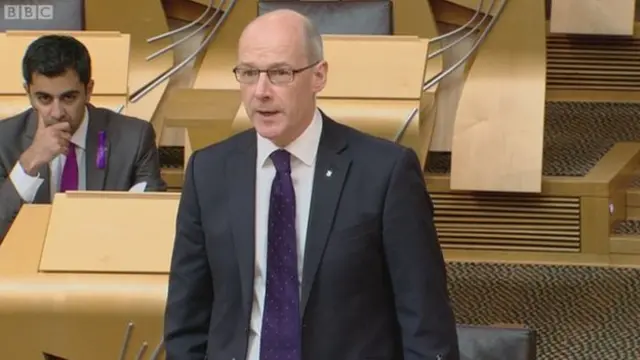
Deputy First Minister John Swinney
Mr Crawford welcomes the constructive dialogue with Scottish secretary, but a lot of work has to be done by the UK government.
Mr Crawford says if the UK government is about to fire the starting pistol and introduce the Scotland Bill next week, we are not yet at the starting line.

Bruce Crawford says the committee thought the UK government should revise its approach to devolving the crown estate.
This report is the result of seven months of intense scrutiny and the report has been well received by a cross spectrum of Scottish society, he says.

The committee expressed serious concerns over the draft clauses relating to the Crown Estate, as they would create two Crown Estates in Scotland.
Mr Crawford says the issue of welfare "reminds me of a quote Sir Harry Burns is fond of recalling by a Los Angeles priest who said what we need is a compassion that stands in awe at the burdens the poor have to carry, rather than stands in judgment at the way they carry it."
The committee considered the draft clauses in relation to Universal Credit could lead to a veto and thus need to be looked at again, says Mr Crawford.
The draft Welfare clauses will impact on the most vulnerable in our society, he says.
He says there will be a significant degree of shared power between the UK government and the Scottish government over welfare and taxation.
The committee convener says there needs to be clarity over how the no detrimental impact principle will be applied.
The SNP MSP says the report was agreed unanimously by all members of the committee.
The recommendations of the committee are there to help the UK government fulfil the recommendations of the Smith Commission, he says.
Mr Crawford says the biggest failings are in the area of the devolution of welfare powers.